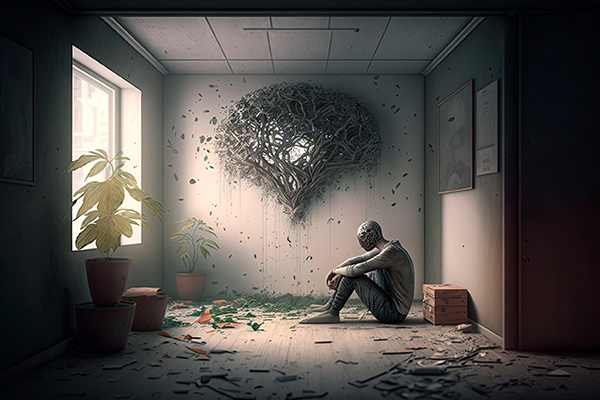release
The Common Cold As A Spiritual Detox
 It is quite common for people going through a period of spiritual growth or awakening to experience physical symptoms and illnesses such as colds, flu, or other infections.
It is quite common for people going through a period of spiritual growth or awakening to experience physical symptoms and illnesses such as colds, flu, or other infections.
Experiencing a nasty cold during your spiritual awakening is not only annoying, but also seems out of place and counterintuitive, especially when you’re supposed to be focusing on expanding your awareness, aligning your energy, and strengthening your connection to spirit and the divine.
However, it is important to know that the onset of physical symptoms, such as a cold or flu, usually has a profound spiritual significance. Although it may seem like an inconvenient interruption or a stroke of bad luck, this type of physical setback is often an essential part of our spiritual journey, as it is a sign that we are releasing old, toxic energies in order to heal and make room for new insights and energy.
I remember a pivotal moment in my own spiritual journey when I came down with a terrible cold. At the time, I was deeply immersed in exploring my Akashic Record and uncovering truths about certain past life traumas – particularly memories of being persecuted as a witch in a past life. This process brought up a flood of intense soul memories and ancient psychic wounds that had been waiting to be processed for several centuries!
One morning, after a particularly intense Akashic meditation the night before, I awoke with a scratchy throat, stuffy nose, body aches, and overwhelming fatigue. Frustrated, I wondered why I was getting sick now, just as I was breaking through to a deeper level of awareness and karmic healing. But as I surrendered to my body’s need for rest and recovery, I soon began to see the deeper purpose of my illness.
Not Everyone Chooses The Path Of Healing
 You’ve probably heard the phrase “what they don’t know can’t hurt them.” Sometimes this is true, but there are also times when what people choose to ignore or disregard can cause real harm – not only to themselves, but also to those around them.
You’ve probably heard the phrase “what they don’t know can’t hurt them.” Sometimes this is true, but there are also times when what people choose to ignore or disregard can cause real harm – not only to themselves, but also to those around them.
For those of us with psychic or spiritual gifts, there’s an added complexity: the ability to sense the struggles of others, which leads to the question of when and how to help.
Intuitives, channelers and healers are very aware of the energy of others, even when we’re just going about our daily routines. Whether it’s a stranger in the grocery store or a friend across the room, we tend to sense when someone is struggling with grief, trauma or stress.
We may choose to quietly send them comforting or healing energy, hoping it will ease their pain, even if only for a moment, yet the urge to help can be very strong in these situations. And while reaching out and offering help can be very uplifting or rewarding for everyone involved, there are times when our attempts to help are met with resistance, or worse, denial.
It’s especially challenging to see someone we care about turn a blind eye to their own needs or pain, and even more so when our support is disregarded or unappreciated.
One of the hardest lessons I have had to learn in both my personal and professional life is that I can only help those who are willing to help themselves. The sad truth is that sometimes people choose not to act on information that could improve their lives or change their destiny. Instead, their negativity, anger, or fear allows the problem to fester or the behavior to grow, affecting not only themselves but also their loved ones. Over time, this denial creates a cycle of suffering that affects physical, mental and karmic health and well-being, sometimes for generations.
Karmic Healing: Can You Handle The Truth?
 In the famous courtroom drama A Few Good Men, Jack Nicholson’s character, Colonel Jessup, exclaims in an iconic movie moment, “You can’t handle the truth!”
In the famous courtroom drama A Few Good Men, Jack Nicholson’s character, Colonel Jessup, exclaims in an iconic movie moment, “You can’t handle the truth!”
I suspect this scene has become legendary in movie history because it resonates so deeply with most people. On some level, many of us sometimes struggle to face the truth about ourselves and our lives.
Whether it’s difficult memories, unhealed wounds, failed relationships, or unspoken regrets, facing our truth can be challenging, even traumatic or overwhelming.
Yet, from a spiritual perspective, facing and owning our truth is one of the most powerful steps we can take on our path to karmic healing and soul growth.
Our soul journey is a karmic balancing act in which the energy we put out into the world eventually comes back to us. When we hide from our truth – whether through denial, justification or avoidance – we accumulate karmic debt.
Like a heavy boulder that we carrry around, karmic debt hinders our soul growth and spiritual progress. On the other hand, when we consciously choose to face our truth, we release this burden and open ourselves to healing, growth, fulfillment and inner peace.
Denial is our most common response to unpleasant truths. We tend to avoid acknowledging aspects of ourselves that we find unattractive, justify our negative behaviors, and make excuses for our bad choices and failures in order to protect our fragile human egos. However, these “untruths” build up over time. By avoiding them, we create layers of illusion that distance us from who we really are and cloud our understanding of our soul purpose and the divine spark within.
Forgiveness Is Choosing To Take Back Your Power
 Ah, forgiveness! Such a misunderstood concept. For many people, forgiveness, as noble as it may sound, is very difficult, even impossible.
Ah, forgiveness! Such a misunderstood concept. For many people, forgiveness, as noble as it may sound, is very difficult, even impossible.
Sometimes certain wrongs are so grave to us that the offender doesn’t deserve forgiveness in our eyes. There is also a misconception that forgiving someone is tantamount to excusing or justifying their terrible actions. But forgiveness is not about absolving someone of responsibility. Instead, it is a powerful, personal act of release and healing.
When we forgive someone, whether they’ve hurt us emotionally, betrayed our trust, or even caused us physical harm, we’re not letting them off the hook.
We are not condoning their actions or giving them permission to repeat those offenses. Rather, we are choosing to free ourselves from the weight of resentment, pain, and bitterness that binds us to them and their past actions.
Forgiveness is a gift we give ourselves. It allows us to move forward without the burden of past grievances and with an open heart, free of resentment.
By forgiving, we determine for ourselves that the transgressor’s actions and the memory of their misdeeds will no longer hold us hostage or march with us into the future.
While we may not be responsible for what happened to us in the past, we are responsible for how we choose to carry the memory of it into the future. This is the power of forgiveness: it gives us the strength to embrace our present reality with clarity, compassion, and freedom. It also transforms our future, for it is ultimately a karmic choice that will shape our destiny in ways we will only understand much later in this life and beyond.
Samhain Ritual For Personal Tranformation
 One of the most mystical and energetically powerful times in the metaphysical calendar is upon us again tomorrow. Samhain, also known as the Celtic New Year, is a sacred festival celebrated on October 31st.
One of the most mystical and energetically powerful times in the metaphysical calendar is upon us again tomorrow. Samhain, also known as the Celtic New Year, is a sacred festival celebrated on October 31st.
Samhain traditionally marks the end of the harvest season and the beginning of the winter. It is a time to honor our ancestors, reflect on the thinning veil between the physical and spirit realms, and set intentions for the new annual cycle ahead.
Samhain holds special significance for those who are attuned to the cycles of nature and the spirit world. Traditionally, the boundaries between the physical and spirit realms were believed to be at their thinnest on this night.
The Celts and Norse in particular saw it as a time when communication with ancestors, departed loved ones and the gods was most possible, providing guidance for the future. For the Vikings and other northern European cultures, Samhain was also a time for divination. Runes, symbols of cosmic wisdom, were often used to gain insight into the coming year.
This year, Samhain carries a particularly powerful energy as it coincides with the Waning Crescent Moon’s transition from Libra to Scorpio. This last lunar phase before renewal invites us to release what no longer serves us, and its journey from the balanced, harmonious energy of Libra into the intense, transformative depths of Scorpio will amplify this process.
Libra’s influence encourages reflection on relationships, inner balance, and the need for harmony, while Scorpio’s energy propels us toward deeper introspection, emotional transformation, and embracing the mysteries of life, death, and rebirth.
Unstuck Your Life By Transmuting Your Origin Story
 Do you feel that no matter what you do, your life experiences seem to be stuck on repeat? Are you living the same scenario over and over with a different cast of characters? Or maybe even the same cast, but going through the same problems over and over with no change? If any of this sounds familiar, you may need to revise your origin story.
Do you feel that no matter what you do, your life experiences seem to be stuck on repeat? Are you living the same scenario over and over with a different cast of characters? Or maybe even the same cast, but going through the same problems over and over with no change? If any of this sounds familiar, you may need to revise your origin story.
We all have an origin story. It is a set of deeply held ideas and beliefs that shapes how we see ourselves and our place in the world. It is the story of that we constantly repeat when we talk about ourselves or think about our life experiences. Internally, we use it to define ourselves, and externally, we use it to present ourselves to others.
Our story of origin comes from family, early life experiences, and the choices we made about ourselves as we grew up. While it helps define us, it can also become a prison, limiting our growth and repeating unsatisfying patterns in what we manifest.
In my work as a psychic consultant, I often find in readings that many people are held back by their origin story without even realizing it. When we hold on too tightly to our chosen narrative, we become trapped in cycles that prevent us from evolving into the version of ourselves we truly want and deserve to be.
An origin story differs from a limiting belief in that it is more about the construction of our identity and personality – who we are and how we want to be in the world. It can be more difficult to identify and deconstruct because it is such a strong part of our personal identity. However, it is similar to limiting beliefs in that it is important to explore and become aware of it because it can hold us back and create very unsatisfying life experiences.
The Spiritual Wisdom Of Letting Go
 I sometimes do readings for clients who feel they have to control absolutely everything in their lives. They are rarely calm, rarely happy, always frazzled. There’s a constant tension around them, a palpable anxiety, as if they’re always one step away from a meltdown, or even a complete breakdown.
I sometimes do readings for clients who feel they have to control absolutely everything in their lives. They are rarely calm, rarely happy, always frazzled. There’s a constant tension around them, a palpable anxiety, as if they’re always one step away from a meltdown, or even a complete breakdown.
Many of us have experienced this feeling or seen it in others – the compulsion to control every outcome, every detail, believing that by sheer force of will we can make life bend to our wishes.
But here’s the thing: life has a way of moving on its own, whether we like it or not. And often, the more we try to grasp and hold on, the more things slip out of our control.
A song that often comes to mind when I think about this is the song Let It Be by the Beatles. Let it be, let it be. There will be an answer, let it be. This timeless classic is a simple yet powerful reminder of the peace that can come from stopping to resist and simply allowing things to unfold as they are meant to.
Letting go is not about giving up; it’s about trusting that life has a rhythm, a universal flow, and when we align ourselves with it, life becomes infinitely more peaceful and enjoyable.
In my work as a psychic consultant, I’ve found that those who feel the need to control every aspect of their lives often carry a heavy burden of stress. They struggle to find joy because they are too preoccupied with micromanaging every little detail. Life becomes a series of hurdles and challenges, and instead of going with the flow, they are constantly swimming against the current. It’s exhausting and soul-destroying.